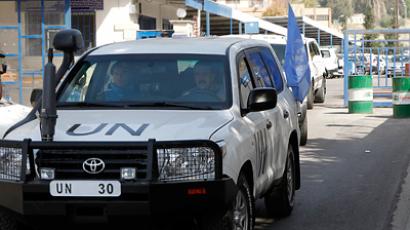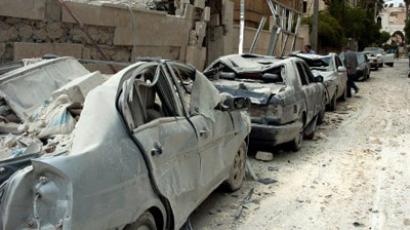‘Assad has a lot of sunny days ahead of him’
The real situation in Syria is absolutely different from how the Western media portray it, historian and political analyst Pierre Piccinin told RT. He visited the turbulent state twice and says it was not as bad as he expected.
RT: You have been to Syria, the latest country you visited for a couple of times, what was your goal in going to that country?Pierre Piccinin: My goal was to get reliable information, so I had to screen all the reports coming from the Western news agencies, magazines and other media. I did some research and found out that there are actually two rival Syrian human rights groups that monitor developments and supply the bulk of information to the West. What I discovered, too, was that the uprising was supported by a minority of the population, which differs from what the Western media are saying when they quote the Syrian Observatory for Human Rights. Also, the Syrian opposition is very much divided – they do not share the same goals and they use different methods to reach their goals. Actually I never questioned the credibility of the information that was coming from the region.RT: You've been critical about the usage as well as reports from Syrian observatory on human rights. But in a scenario like this it would be difficult to clarify every single death in the country. So what's your criticism based on?PP:First of all, I don’t think it’s too hard to have a more-or-less clear idea about what’s happening in Syria. I’ve been able to visit the country twice in the last six months. I rented a car, drove all over Syria, was able to go even to Hama and Homs. I was never detained at any military checkpoints. The Western media choose to rely exclusively on the Syrian Observatory for Human Rights. I published the results of my investigation in the Afrique Asie magazine last month. There, I say that there are two such “observatories”, and they are both connected with the opposition. In reality these organizations are the opposition’s propaganda agencies, propaganda tools. I don’t understand why the media choose to use them as the source. It is part of the journalist’s job to think critically, verify sources and be extremely cautious. But they decide to just spread the information they receive from the Syrian Observatory for Human Rights, without asking any questions. Let me give a clear answer to your question. I am saying that several dozens were killed in the armed conflict. But journalists are talking about reprisals by the regime. If the government attacks peaceful protesters, we can call it reprisals, but if the Syrian authorities are dealing with an army based in refugee camps in Lebanon and Turkey, financed from Qatar, and trained by the French army – it’s not repression. The regime is defending its territory from foreign aggression! RT: How do we classify the events in Syria then? Is it a civil war, is it an uprising, is it a revolution?PP: I think it is a revolution. I think we can say that. But there are Islamist groups in Syria that are trying to use this situation and turn Syria into an Islamic republic, something like a Salafi caliphate. In a way, this is similar to what happened in Libya – there was a civil war between tribal clans, and now a group of Salafis is represented in the new “government” of Libya. The same is happening in Mali, this problem has recently become a popular topic of discussion – Islamist groups spread throughout the Sahara and got into sub-Saharan African countries. There is something unhealthy about these groups, acting alongside the revolutionaries. It is impossible to identify or contact them. They are truly secret groups. RT: Since the beginning of the crisis, the government has always stuck to one line that there are armed groups, or they are supported from outsiders, by foreigners. Are they blind to what's happening in the country, to the possibility that this is a real revolution? Are they right or wrong? How would you assess the government now?PP: First of all, as for the government’s rhetoric… I don’t believe the Syrian government to be blind. Rhetoric and reality are two different things. Syria’s government is in denial of the fact that a revolution is taking place. They are talking about some foreign conspiracy, about Israel and the US plotting against Syria… My analysis of the situation is completely different: I think that starting with 2001, after 9/11, the US chose to cooperate closer with the Syrian government. And they both discovered a mutual enemy – the Islamists. And I think that the US is very unhappy with what is going on now. Israel is also very concerned now. Should the Syrian regime collapse, the country could sink into chaos, and then Israel will have significant problems with it, whereas now, despite the prevailing anti-Israeli rhetoric in Damascus, Israel is in fact quite comfortable with the current regime. In reality, they are getting along pretty well.At the moment we see that the ruling regime has successfully established control over most of Homs, as well as over Idlib and Hama, and is fighting the Free Syrian Army on the borders. The regime is far from collapsing; it’s nowhere near a downfall. Bashar Assad has a lot of sunny days ahead of him. Many people asked me, “How can you say such things? You’re advocating the regime!” No, I’m not advocating the regime. I am doing my research. I want to see what happens on the ground. I take the facts and draw conclusions. RT: How do you see the Syrian conflict ending?PP: Unless, of course, there is an intervention from outside, I expect that the Ba’athist government will be well able to control the situation with military force. After that, I think, it will conduct progressive reforms to develop democracy. This may even be a formal democracy. At the initial stage, I believe, to a large degree this democracy will be formal. Yet civil society is awakening and making its position known, and in the future the government will have to make a turn towards real democracy.















